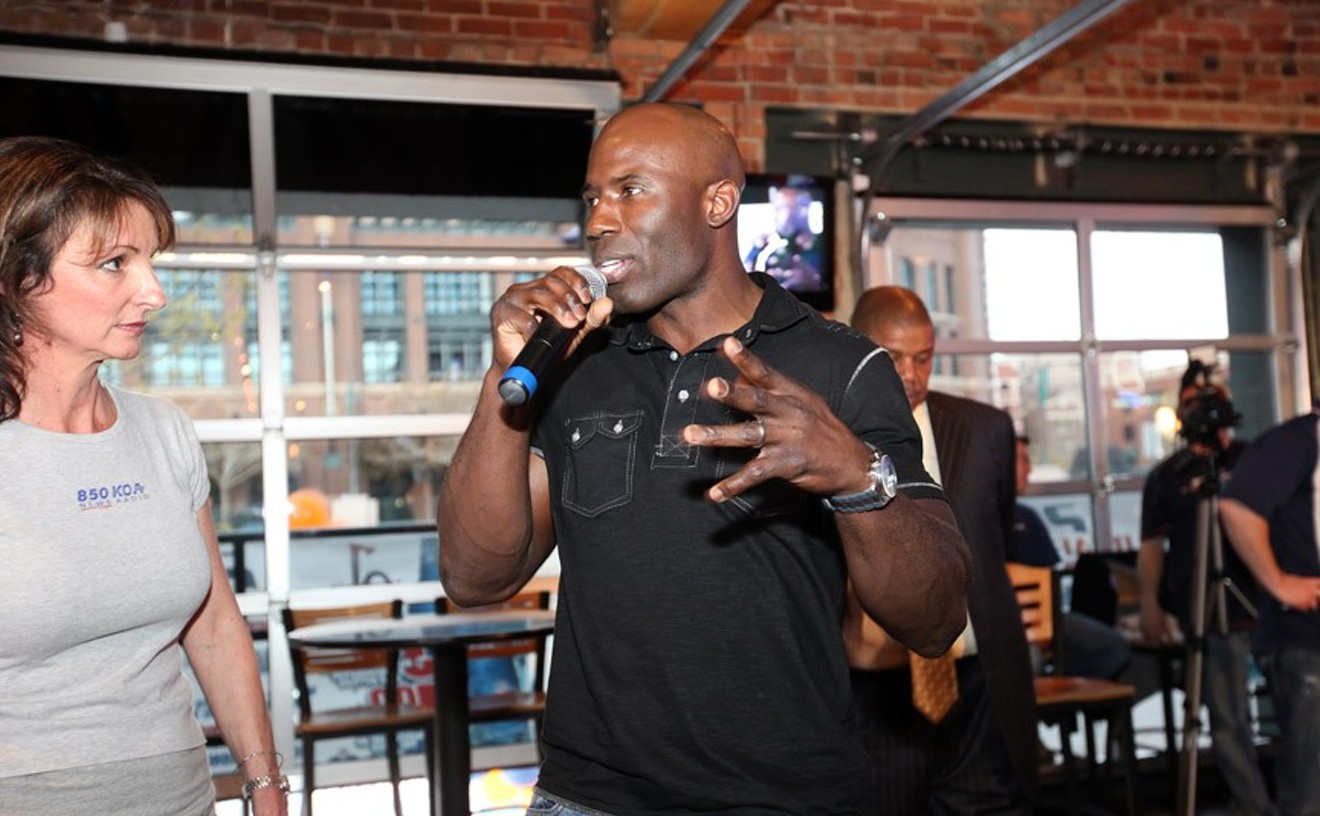A new lawsuit against Walmart maintains that a supervisor at a Colorado Springs outlet told staffers that an HIV-positive clerk had AIDS, a falsehood that led to ostracism and a significant deterioration in her physical and mental health. Then, after the employee revealed these actions to the store manager, she allegedly became the victim of retaliation that led directly to her losing her job.
Backing up the claims made by the worker, who is referred to as Jane Doe in the suit, is the federal government. In its official "determination of plaintiff's charge," a report by the Equal Employment Opportunity Commission notes that the agency "considered all the evidence obtained during the investigation and find[s] that there is reasonable cause to believe that there is a violation of the ADA [Americans With Disabilities Act] in that [Plaintiff] was harassed because of her disability and subjected to retaliatory disciplinary action after complaining. The Commission further finds a violation of the ADA in that [Walmart] disclosed [Plaintiff's] disability to co-workers without the right to know."
In response to the lawsuit, Walmart spokesman Randy Hargrove declines to comment about the specific charges. "Out of respect for the privacy of our former associate, we will respond as appropriate with the court," he says. But he adds that "we respect the privacy of our associates and take allegations like this seriously."
Jane Doe is represented by Eudoxie (Dunia) Dickey, managing attorney for Denver-based Civil Rights & Employment Law Advocates, LLC, for whom the case triggered a sense of déjà vu. A few years back, she was part of a legal team that worked on behalf of a John Doe plaintiff who sued Aspen Valley Hospital after a staff member divulged his HIV-positive status. In 2016, the hospital settled the case with a payment of $800,000.
According to Dickey, the events at the center of the latest case took place in 2013 and 2014 at Walmart Store No. 3083, located at 665 North Murray Boulevard. Jane "had worked there for approximately six years as an hourly worker," she points out. "She wasn't management. And she had transferred there from another Walmart store, where she'd had no problems" despite assorted health challenges.
The HIV-positive diagnosis was made in 2007, Dickey says. "She was infected by her ex-husband through no fault of her own. She was not a drug user. She was not engaging in high-risk behavior. It was just a tragic situation over which she had no control."
The condition meant that Jane had "a higher tendency to get sick, especially when under stress, due to the problems in her immune system caused by the HIV," Dickey goes on. "So she said to the store manager, Tammy Cooper, and the store's personnel manager, on a confidential basis, 'Hey, guys, I have HIV, so I anticipate that I may occasionally need to call in sick and take time off to deal with these health problems. I want you to know in advance so there won't be any issues and you'll be able to grant these absences as excused.'"
These arrangements shouldn't be looked upon as special privileges, Dickey stresses. They're the law. "The Americans With Disabilities Act calls for employers to reasonably accommodate disability, and HIV is recognized as a disability under the terms of the ADA."
For the first year or so after Jane's 2012 transfer to Store No. 3083, she didn't experience any difficulties. But then, Dickey says, "there was an overnight shift manager, Connie Whisenhunt, who didn't like the fact that my client, who worked on the morning shift, called in sick so often. Connie was one of the four individuals at the store who had reason to know about her HIV-positive status, because she'd be calling them to say, 'I'm sick.' And at one point in approximately May or June of 2013 — and we don't know exactly why she did this — she started spreading rumors in the store to other co-workers that my client had AIDS."
Dickey stresses that this was "factually untrue. She had HIV, which at that point was undetectable. Individuals only suffer from AIDS if HIV is untreated." This distinction has been understood for decades, "but even in this day and age, there's still a lot of fear and ignorance and stigma around HIV and AIDS, and that's borne out by the actions that led to the filing of this lawsuit. It shows up in people's behavior. My client has learned that from hard experience."
The bogus story "spread around the store like wildfire," Dickey continues, "and one day when she was out, her manager [Cooper] called her and told her, 'There's a rumor on the night shift that you have AIDS.' This was later confirmed to Jane by two co-workers, who said Connie personally told one of them that she had AIDS. And the next day, when she came back to work, Jane realized that this was very serious — that it was going to damage her reputation and possibly her job prospects. So she went to Tammy and made a complaint."
Cooper replied that she would launch an investigation, the lawsuit states, and asked that Jane write a statement about what happened; she said she'd make the same request of others at the store. Meanwhile, Dickey says, Jane "complained through every official and unofficial Walmart channel she could think of. She complained to the Walmart ethics hotline, she complained to the human resources department at the store. She even complained to the theft-prevention manager."
In the meantime, Dickey continues, "she realized that her co-workers were treating her completely differently. They would look away when they saw her, they wouldn't make eye contact, they wouldn't give her hugs anymore. Where previously she had been accepted by the team, they were now treating her like a pariah. And Connie ordered other employees not to speak to the plaintiff. She said, 'If you go talk to her, I'm going to give you a disciplinary write-up,' and even retaliated against the two workers who had participated in the investigation. They had to transfer to another store."
As for the investigation itself, "no one at Walmart ever told my client the results or took any corrective actions," Dickey charges. "In a nutshell, Walmart swept this under the rug and chose to believe Connie, who denied making this disclosure even though there was a lot of evidence in these statements. They didn't take any actions to protect my client and rewarded Connie by moving her to the morning shift, which made her my client's direct supervisor and put her in a position of power over her — the individual whose HIV status she'd illegally disclosed to people who had no right or need to know."
What followed, Dickey says, is a retaliatory pattern she's seen in many cases that she's handled over the years. Whisenhunt began naming Jane in numerous "Coachings" — that's the term Walmart uses for its documentations of policy infractions — that the attorney characterizes as consistently trumped up, changed her schedule so that she could no longer go to Sunday services at the Mormon chapel she attended, and allegedly kept telling other employees to steer clear of her. In Dickey's words, "My client was heartbroken. Her worst fears had been realized. She thought Walmart would safeguard the information about her, which is their obligation under federal and state law, and they let it get out. In any organization, there are always bad apples, but what matters is what the company chooses to do about it — and the company did nothing."
As a divorced woman who relied on her Walmart wages to live, Jane couldn't afford to quit, and thanks to the number of "Coachings" she'd received, she wasn't allowed to transfer to another store. So she filed a complaint with the EEOC — a required predicate to a lawsuit — and in 2015, the agency ruled in her favor. "It's rare for the EEOC to find that one party is at fault and invite a conciliation process, but that's what happened," Dickey says. "And my client wanted to work with them to resolve the situation and continue her career there. But Walmart declined to conciliate the matter. The company dug in its heels the whole way through."
The anxiety Jane sustained as a result took what Dickey describes as "a devastating toll on her health. She came down with meningitis twice and had to be hospitalized. Her left leg suddenly went numb shortly after the unauthorized disclosure, and she suffered back problems. She was diagnosed with fibromyalgia and broke out in shingles. And by the fall of 2014, her doctors advised her that she had to take time off pursuant to the Family and Medical Leave Act to regain her health."
Stepping away from Walmart didn't immediately cure her ills. Months later, Dickey says, "her FMLA was getting ready to expire — but Walmart didn't care about her. Instead, they sent her a letter on Christmas Eve 2014 giving her an ultimatum. In effect, they said, 'Either come back to work tomorrow or your job will be gone and you'll be terminated.' She doesn't even remember this because she was so sick at the time. Her memories are hazy. But she had a friend deliver a note to the store the next day saying, 'I'm too sick to go back to work right now.' But she didn't intend to resign. She intended to go back to work."
She didn't have this chance. In January 2015, Jane reached out to Sedgwick, a company that manages employee leave for Walmart on a contract basis, to arrange for her return, and was informed that she'd already been terminated.
Today, Jane remains unemployed. "She hasn't been able to work since then," Dickey allows. "She's like a hermit. She has children and grandchildren and family, but she's lost friends over this. And the trauma continues to affect her on a daily basis."
Her health issues haven't gone away, either. But she's prepared to fight for her rights over the long haul, despite the power of her opponent.
"My client spoke to several civil-rights unemployment lawyers before me, and she said they got a bit nervous about suing Walmart," Dickey says. "But Jane wasn't afraid. She knew this was something she needed to do, because Walmart wasn't taking her seriously. Considering what she's been through and how disabled she is, she's a very strong person, and I really respect her. She's a tough cookie."
Click to access Jane Doe v. Walmart Stores, Inc.
[
{
"name": "Air - MediumRectangle - Inline Content - Mobile Display Size",
"component": "12017618",
"insertPoint": "2",
"requiredCountToDisplay": "2",
"watchElement": ".fdn-content-body",
"astAdList": [
{
"adType": "rectangle",
"displayTargets": "mobile"
}
]
},{
"name": "Editor Picks",
"component": "17242653",
"insertPoint": "4",
"requiredCountToDisplay": "1",
"watchElement": ".fdn-content-body",
"astAdList": [
{
"adType": "rectangle",
"displayTargets": "desktop|tablet"
},{
"adType": "rectangle",
"displayTargets": "desktop|tablet|mobile"
}
]
},{
"name": "Inline Links",
"component": "18838239",
"insertPoint": "8th",
"startingPoint": 8,
"requiredCountToDisplay": "7",
"maxInsertions": 25
},{
"name": "Air - MediumRectangle - Combo - Inline Content",
"component": "17261320",
"insertPoint": "8th",
"startingPoint": 8,
"requiredCountToDisplay": "7",
"maxInsertions": 25,
"watchElement": ".fdn-content-body",
"astAdList": [
{
"adType": "rectangle",
"displayTargets": "desktop|tablet"
},{
"adType": "rectangle",
"displayTargets": "desktop|tablet|mobile"
}
]
},{
"name": "Inline Links",
"component": "18838239",
"insertPoint": "8th",
"startingPoint": 12,
"requiredCountToDisplay": "11",
"maxInsertions": 25
},{
"name": "Air - Leaderboard Tower - Combo - Inline Content",
"component": "17261321",
"insertPoint": "8th",
"startingPoint": 12,
"requiredCountToDisplay": "11",
"maxInsertions": 25,
"watchElement": ".fdn-content-body",
"astAdList": [
{
"adType": "leaderboardInlineContent",
"displayTargets": "desktop|tablet"
},{
"adType": "tower",
"displayTargets": "mobile"
}
]
}
]














